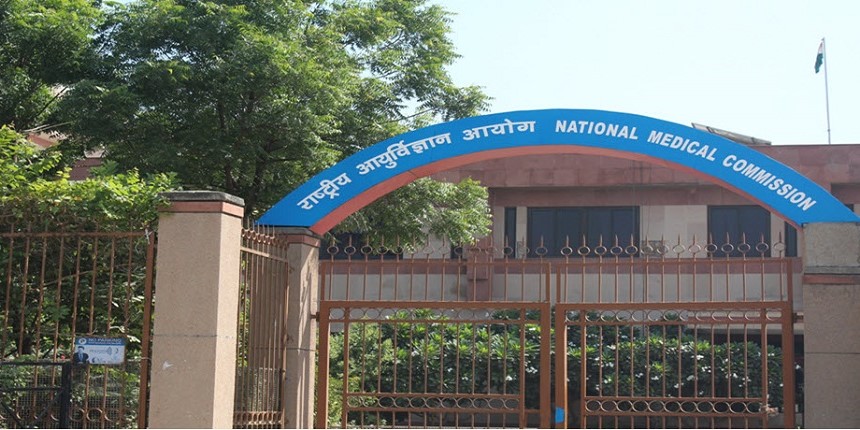220 beds, 5 departments, 75% faculty attendance: NMC guidelines for PG medical courses
Sanjay | January 17, 2024 | 04:44 PM IST | 3 mins read
NMC guidelines require full-time faculty who can’t engage in private practice during college hours.

NEW DELHI: All government and private medical colleges must have at least 220 beds to start postgraduate (PG) medical courses. They should have five departments and at least 80% of the hospital beds should be occupied throughout the year. These are part of the “minimum standard of requirements” for postgraduate courses (PGMSR, 2023), issued by the Postgraduate Medical Education Board (PGMEB), National Medical Commission.
In September 2023, NMC had invited the stakeholders’ comments on its draft minimum standard of requirements for postgraduate courses 2023 (MSR-23). The apex medical education regulator has now issued the final guidelines after receiving suggestions. These guidelines will come into force with immediate effect.
The five departments each medical college offering programmes in PG medicine must have include biochemistry, pathology, microbiology, radio-diagnosis and anaesthesiology.
Medical college infrastructure
According to new NMC guidelines, the hospital building shall conform to the existing national building norms and local statutory regulations for hospitals. The hospital should have administration, registration, records storage, out-patient and inpatient areas, operating theatres, Central Sterile Services Department (CSSD), Intensive Care Unit (ICU), radiology and laboratory services and emergency areas.
There should be an increase in the faculty, infrastructure and other staff in radio-diagnosis, anesthesia, pathology, microbiology, and biochemistry with the increase in the number of beds in the hospital. “Also, there shall be an increase in the faculty and infrastructure, if workload in the department is more,” NMC said.
The departments should have an adequate number of latest in-house equipment and training facilities for the training of post-graduate students. The departments should also have a digital library and seminar hall with well-equipped high speed internet, Wi-Fi connected media room to have direct relay from in-house operation theaters and also to conduct or attend global scientific live programmes. There should be a departmental library with essential books and journals as per curriculum requirements.
The institution should also have adequate in-house laboratory and imaging facilities and there should be a facility of keeping digital data of records of investigations done in various departments and laboratories. Medical colleges should have a well-equipped air-conditioned blood bank capable of' providing component therapy.
A total of 80% percent of the hospital beds should be occupied.
“Minimum 15 percent of the total beds in the department imparting post-graduate training should be Intensive Care Unit (ICU) beds/High Dependency Unit (HDU) beds exclusively of that Department. There shall be adequate space and sufficient number of examination cubicles available in the Out-Patient Department (OPD),” NMC said.
PG Medicine: Teaching
According to new NMC guidelines for PG medical courses, there should be one teaching room for each teaching department with a capacity to accommodate an adequate number of students for clinical case discussions and demonstrations. Each such room should also have audio-visual facilities.
NMC has said that the faculty should be “full-time and shall not engage in private practice during college hours. It shall be mandatory to have at least 75 per cent attendance of the total working days for the required number of faculties”.
Every medical college should have a prescribed number of cameras and should have its own website containing all the details.
All the medical colleges running PG medical courses should have facilities for teaching the basic science subjects as per requirements.
Workload for PG medical students
According to guidelines, the average daily out-patients’ attendance should not be less than 60 in general medicine; general surgery; pediatrics; orthopedics; obstetrics and gynecology; respiratory medicine; ophthalmology; dermatology, venereology and leprosy; psychiatry; and emergency medicine. In the draft, the minimum number required was 50.
In other clinical broad specialities and super specialities should be at least 30, up from 25 in the draft.
Postgraduate students pursuing surgical courses should get operation theatre training for at least two full days in a week while second year onwards, trainees will get training as first assistant or supervised performance for two full days in a week, the guidelines state. Every unit will perform a minimum of three major and six minor surgeries on operation day of the Unit.
Obstetrics and Gynecology (OBG) and pediatrics departments students should make 25 deliveries per week.
Follow us for the latest education news on colleges and universities, admission, courses, exams, research, education policies, study abroad and more..
To get in touch, write to us at news@careers360.com.